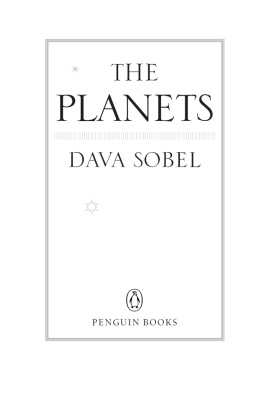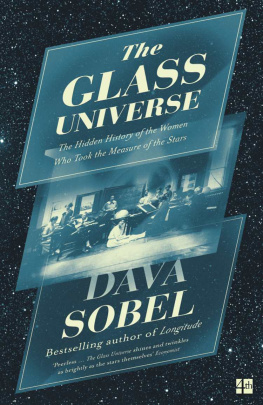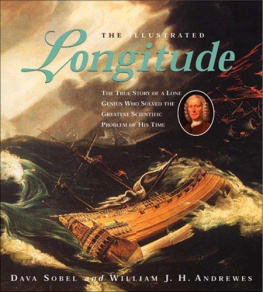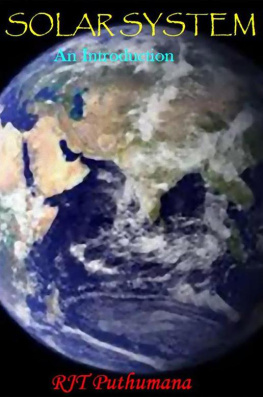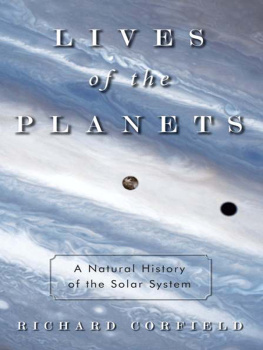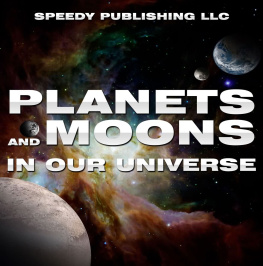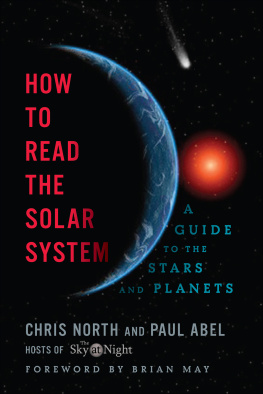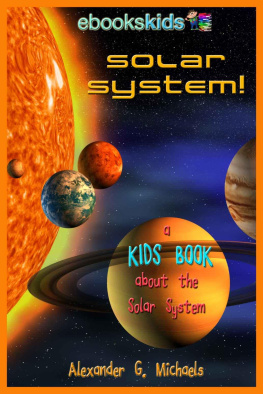PENGUIN BOOKS
THE PLANETS
Dava Sobel, a former New York Times science reporter, is the author of Longitude, Galileos Daughter, and Letters to Father. In her thirty years as a science journalist, she has written for many magazines, including Audubon, Discover, Life, and The New Yorker, served as a contributing editor to Harvard Magazine and Omni, and coauthored six books, including Is Anyone Out There? with astronomer Frank Drake and The Illustrated Longitude with William J. H. Andrewes.
For her efforts to increase the public understanding of science, Sobel has been awarded the National Science Boards prestigious Individual Public Service Award, the Bradford Washburn Award from the Boston Museum of Science, and the Harrison Medal from the Worshipful Company of Clockmakers. In recognition of her writing about astronomy, asteroid 30935 has been named in her honor.
THE
PLANETS

DAVA SOBEL

PENGUIN BOOKS
Published by the Penguin Group
Penguin Group (USA) Inc., 375 Hudson Street, New York, New York 10014, U.S.A. Penguin Group (Canada), 90 Eglinton Avenue East, Suite 700, Toronto, Ontario, Canada M4P 2Y3 (a division of Pearson Penguin Canada Inc.) Penguin Books Ltd, 80 Strand, London WC2R 0RL, England Penguin Ireland, 25 St Stephens Green, Dublin 2, Ireland (a division of Penguin Books Ltd) Penguin Group (Australia), 250 Camberwell Road, Camberwell, Victoria 3124, Australia (a division of Pearson Australia Group Pty Ltd) Penguin Books India Pvt Ltd, 11 Community Centre, Panchsheel Park, New Delhi 110 017, India Penguin Group (NZ), cnr Airborne and Rosedale Roads, Albany, Auckland 1310, New Zealand (a division of Pearson New Zealand Ltd) Penguin Books (South Africa) (Pty) Ltd, 24 Sturdee Avenue, Rosebank, Johannesburg 2196, South Africa
Penguin Books Ltd, Registered Offices:
80 Strand, London WC2R 0RL, England
First published in the United States of America by Viking Penguin,
a member of Penguin Group (USA) Inc. 2005
Published in Penguin Books 2006
Copyright Byron Preiss Visual Publications, Inc., 2005
Illustrations copyright Lynette R. Cook, 2006
All rights reserved
Some of the ideas expressed in chapter one appeared in slightly different format in A Reporter at Large: Among Planets by Dava Sobel, published in The New Yorker, December 9, 1996. Parts of chapter six appeared in a Hers column, called Moon Dust, by Dava Sobel, in The New York Times Magazine, October 1, 1995.
Excerpt from The Cosmic Connection: An Extraterrestrial Perspective by Carl Sagan, produced by Jerome Agel. Used with permission.
Excerpt from The Literate Farmer and the Planet Venus from The Poetry of Robert Frost, edited by Edward Connery Lathem. Copyright 1942 by Robert Frost. Copyright 1970 by Lesley Frost Ballantine. 1969 by Henry Holt and Company, LLC.
Excerpts from The Planets: A Pastoral by Diane Ackerman, used with permission of the poet.
THE LIBRARY OF CONGRESS HAS CATALOGED THE HARDCOVER EDITION AS FOLLOWS:
Sobel, Dava.
The Planets / by Dava Sobel
p. cm.
Includes bibliographical references and index.
ISBN: 978-1-101-65948-9
1. Planets. 2. Solar system. I. Title.
QB601.S63 2005
523.2dc22 2005047071
Designed by Carla Bolte
Except in the United States of America, this book is sold subject to the condition that is shall not, by way of trade or otherwise, be lent, resold, hired out, or otherwise circulated without the publishers prior consent in any form of binding or cover other than that in which it is published and without a similar condition including this condition being imposed on the subsequent purchaser.
The scanning, uploading and distribution of this book via the Internet or via any other means without the permission of the publisher is illegal and punishable by law. Please purchase only authorized electronic editions, and do not participate in or encourage electronic piracy of copyrighted materials. Your support of the authors rights is appreciated.
Dedicated
with worldfuls of love
to my big brothers,
Michael V. Sobel, M.D.,
who named our family cat Captain Marvel,
and Stephen Sobel, D.D.S.,
who bunked with me at Space Camp.
At night I lie awake
in the ruthless Unspoken,
knowing that planets
come to life, bloom,
and die away,
like day-lilies opening
one after another
in every nook and cranny
of the Universe.
Diane Ackerman, from The Planets: A Cosmic Pastoral
In all the history of mankind, there will be only one generation that will be first to explore the Solar System, one generation for which, in childhood, the planets are distant and indistinct discs moving through the night sky, and for which, in old age, the planets are places, diverse new worlds in the course of exploration.
Carl Sagan, from The Cosmic Connection:
An Extraterrestrial Perspective
MODEL
WORLDS
M y planet fetish began, as best I can recall, in third grade, at age eightright around the time I learned that Earth had siblings in space, just as I had older brothers in high school and college. The presence of the neighboring worlds was a revelation at once specific and mysterious in 1955, for although each planet bore a name and held a place in the Suns family, very little was known about any of them. Pluto and Mercury, like Paris and Moscow, only better, beckoned a childish imagination to ultra-exotic utopias.
The few sure facts about the planets suggested fantastic aberrations, ranging from unbearable extremes of temperature to the warping of time. Since Mercury, for example, could circle the Sun in only 88 days, compared to the Earths 365, then a year on Mercury would whiz by in barely three months, much the way dog years packed seven years of animal experience into the dog owners one, and thereby accounted for the regrettably short lives of pets.
Every planet opened its own realm of possibility, its own version of reality. Venus purportedly hid lush swamps under its perpetual cloud cover, where oceans of oil, or possibly soda water, bathed rain forests filled with yellow and orange plant life. And these opinions issued from serious scientists, not comic books or sensational fiction.
The limitless strangeness of the planets contrasted sharply with their small census. In fact, their nine-ness helped define them as a group. Ordinary entities came in pairs or dozens, or quantities ending in a five or a zero, but planets numbered nine and nine only. Nine, odd as outer space itself, could nevertheless be counted on the fingers. Compared to the chore of memorizing forty-eight state capitals or significant dates in the history of New York City, the planets promised mastery in an evening. Any child who committed the planets names to memory with the help of an appealing nonsense-sentence mnemonicMy very educated mother just served us nine piessimultaneously gained their proper progression outward from the Sun: Mercury, Venus, Earth, Mars, Jupiter, Saturn, Uranus, Neptune, Pluto.
The manageable sum of planets made them seem collectible, and motivated me to arrange them in a shoe-box diorama for the science fair. I gathered marbles, jacks balls, Ping-Pong balls, and the pink rubber Spaldeens we girls bounced for hours on the sidewalk, then I painted them with tempera, and hung them on pipe cleaners and string. My model (more like a doll house than a scientific demonstration) failed to give any real sense of the planets relative sizes or the enormous distances between them. By rights I should have used a basketball for Jupiter, to show how it dwarfed all the others, and I should have mounted everything in a giant carton from a washing machine or a refrigerator, the better to approximate the Solar Systems grandiose dimensions.

